By Marina De Greef, Tobi Jacobi, and Sarah Neve
Writing Tip of the Day: Map out which writing tasks you can accomplish before each port to make upcoming port/class turnarounds manageable. Gather a few sources and make an outline or commit to writing a few paragraphs before stepping off the ship.
—Dean’s memo, March 16, 2023
Writing centers have a storied history as shape shifters, squeezing into small quarters or flex spaces and expanding into well-outfitted learning centers and digital realms. We move and adapt and often do whatever necessary to keep our campus and community writers afloat. This month’s post features a writing center on the M.V. World Odyssey, a sea-worthy campus for over five hundred students.
Semester at Sea (SAS) is a study abroad opportunity for students from all over the world to come together and live on a ship for four months while earning credit from our academic partner, Colorado State University (CSU). Students take a full load of courses which are punctuated by visits to ten countries for four to six days at a time. SAS is a full college campus with over fifty available classes, student housing “seas” (like residence halls), student clubs, campus events, field experiences, a union, a library, a rec area—and a writing center. The design and facilitation of a writing center at sea in some ways mimics the practices of a tradition writing center (e.g., intentional consultant training, a rhetorical approach to writing consultation, confidential sessions), but in other ways it was been highly influenced by a sea-based learning community that operates outside the boundaries of conventional workdays and even work weeks. Our voyage launched in Dubai, UAE and sailed for 103 days, moving writers between three continents and myriad new experiences.

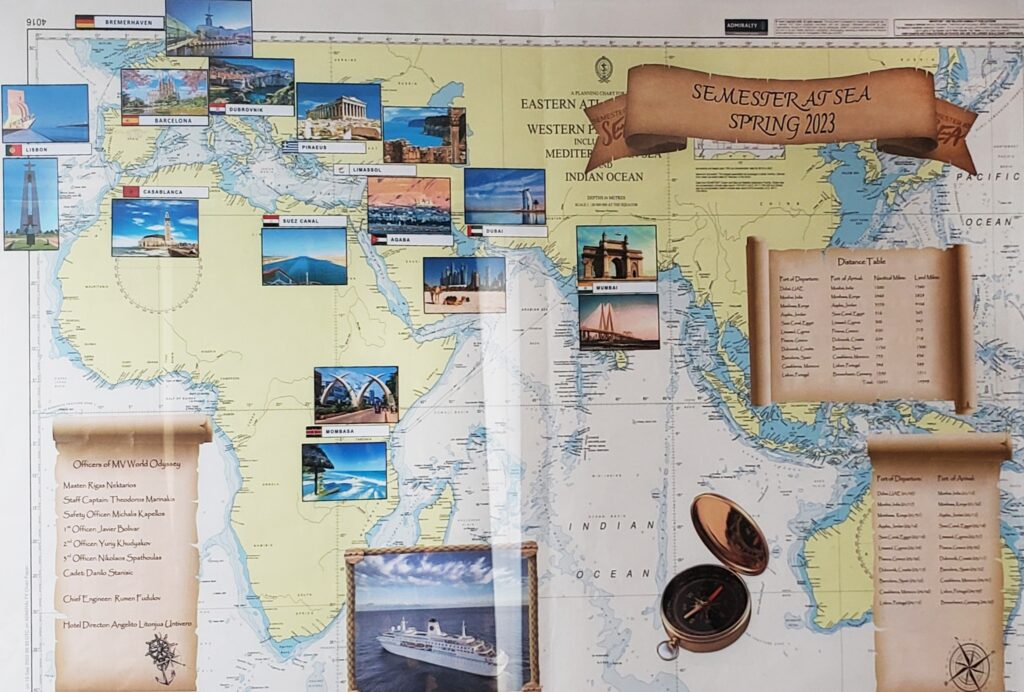
While many writing consultants are hired and trained in advance of a semester’s beginning, our staff met during the first days on board. We were a staff of three: one director and two student consultants with a diverse set of writing center experiences between us. We spent the opening days at sea orienting ourselves to our new space (more on that in a moment) and reviewing an adapted handbook from the CSU Writing Center to align ourselves to some best practices for consulting during the 56 days we would spend at sea. When our student consultants’ own class schedule conflicted with the only writing center hours available, we initiated a “pop-up” writing center in the ship library on deck 6. We created some portable signs and offered consulting during a couple flex hours in the ship library and regular afternoon hours in the “center.”
Working with Writers Ages 5 to 60 (but mostly in their 20s)
Any passenger could utilize our services, supporting the core value of community and Semester at Sea’s motto “The world is our campus.” Students came from dozens of universities and colleges all over the world with majors ranging from English to environmental communication to engineering (among others). In addition, where voyagers (as we were collectively known) were in their educational journeys varied tremendously; there are gap-year students, college students, postgraduates, as well as children, high schoolers, and adults. This diverse range of writers meant that we worked with a wider range of writing genres and skill levels than most land-based and institution-specific writing centers.
We couldn’t rely on collective “center” memory or consultant familiarity with a particular course or professor or even an institution’s home culture as it influences student expectations about work and behavior. Cultural expectations about citation, for example, vary significantly between the United States, South Korea, and Kenya. Consultations included a wide range of writing questions, assignments, and genres including resumes, cover letters, content-specific essays, creative writing, college application essays, reflection papers. As consultants, we used a conversational model and rhetorical tools to explain modern rules of writing broadly and did our best to help students unpack SAS faculty expectations and course assignments. Just like being a consultant at land, we had to be patient and understand the different educational and cultural backgrounds we had onboard.
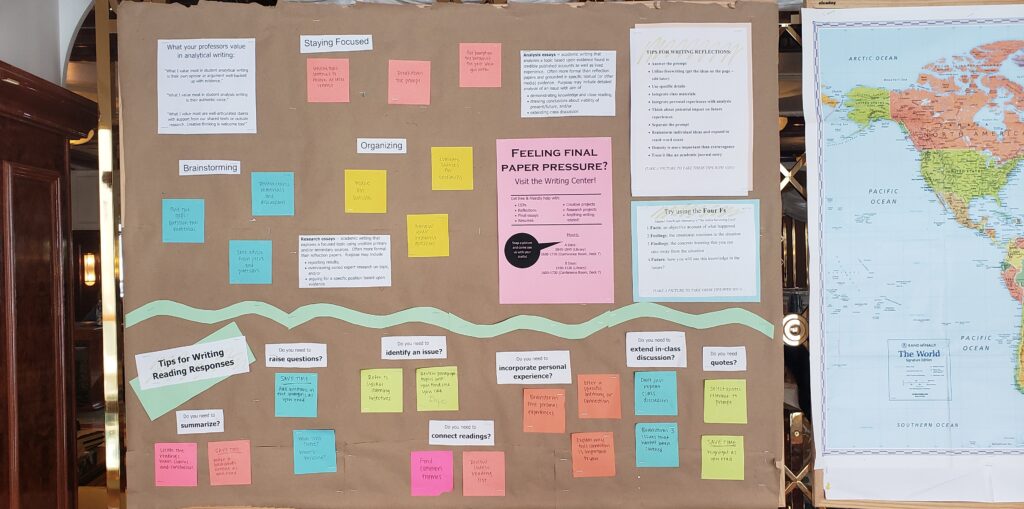
Being a consultant in such a small community is a different experience than on our home campuses in other ways too. Most of us were around 20 years old and in the middle of our college experiences, and many of us got to know each other quickly. When someone unfamiliar came in, it was interesting to see them just moments later at dinner or walking down the hallway. This deepened our relationships and investments in writers’ success. We suspect it also helped some writers come back multiple times as different assignments came due or drafts progressed. It also enabled some impromptu writing across the curriculum work with faculty through informal consultations on designing writing assignments over tea and opportunities to arrange class visits to encourage students to start early on course writing assignments.
Our emerging sense of community meant that we could extend writing support to our unique audience. For example, Tobi presented a lifewriting workshop to a group of lifelong learners and participated in an evening seminar on the virtues and practicalities of keeping a travel journal, experiences that may have been less likely on land.
One really unique group for a campus writing center was the “ship kids.” Ship kids can range in age from toddlers to high school seniors who also took classes. A few high school students used the Writing Center to work on college resumes and application essays. One memorable moment was when a 12-year-old came into the Writing Center wanting to write some poems about his experience on Semester at Sea. He was very engaging and excited to learn how to write poems and took in every tip and trick we gave him. In turn, Sarah was so happy to share her knowledge and love of poetry with someone so willing to learn.
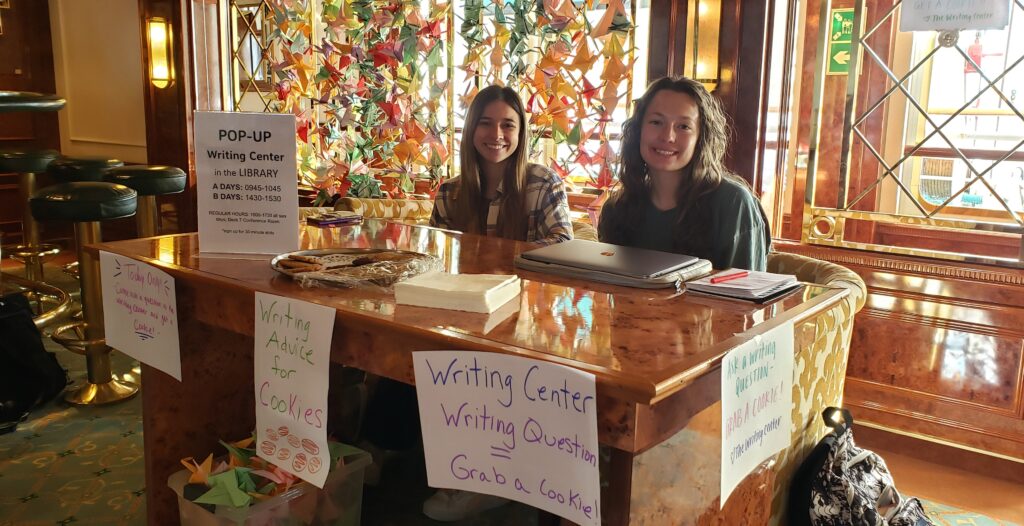
A Writing Center on a Ship = Flexibility, Flexibility, and More Flexibility
Our SAS dean encouraged our community to adopt flexibility as a guiding principle, and this was very relevant to our writing center work. Diverse needs guided us toward a flexible approach to defining our relationships with writers especially since we often learned, ate and recreated alongside each other. Sometimes we were classmates and so could relate more directly to the assignment and its context. Sometimes we had to adjust our expectations of and guidance on writing process/product due to “the on-ship/off-ship” calendar rhythm of SAS.
At times, we also rethought the usual writing center practice of allowing writers to largely guide sessions and provided more directive advice. This recognized the absence of resources students might usually access to complete work independently or an inability to verify information in assignment prompts. Acknowledging the needs of individual writers in this unique learning context allowed us to respond with helpful ideas while also maintaining academic integrity boundaries.

We embraced flexibility in material ways as well. Life on a small cruise ship means every space is used to its maximum availability. The primary writing center also functioned as the sole conference room on the ship and was booked until we opened at 4pm every day. The small room also moonlighted as a special events dining room and featured a large oval table covered in a white tablecloth, a somber collection of framed drawn historical figures and a patchwork of dining chairs crammed so tightly around the table was sometimes hard to move. Sometimes crew staff entered to grab leftover dishes from a meeting or to collect cutlery for an upcoming specialty event in the adjacent fine dining room. We also consulted through the cheers of ping pong tournaments right outside and war cries from movies in the history class next door. We hoorahed ourselves after some signage and a small wooden doorstop appeared a few weeks in allowing us to signal to students that the SAS writing center was open and ready to for writing.
Something drastically different from campus writing centers on land was that the internet was not readily at our disposal. In fact, we’re told to actively not rely on it. Internet in the middle of the ocean is limited and slow. One outcome of this reality was that there were far less research papers or essays requiring citations assigned and instead far more reflection-based pieces. Many students haven’t written in a reflective manner and come into the Writing Center wondering where to start or how to write so many different reflections in so many different ways.

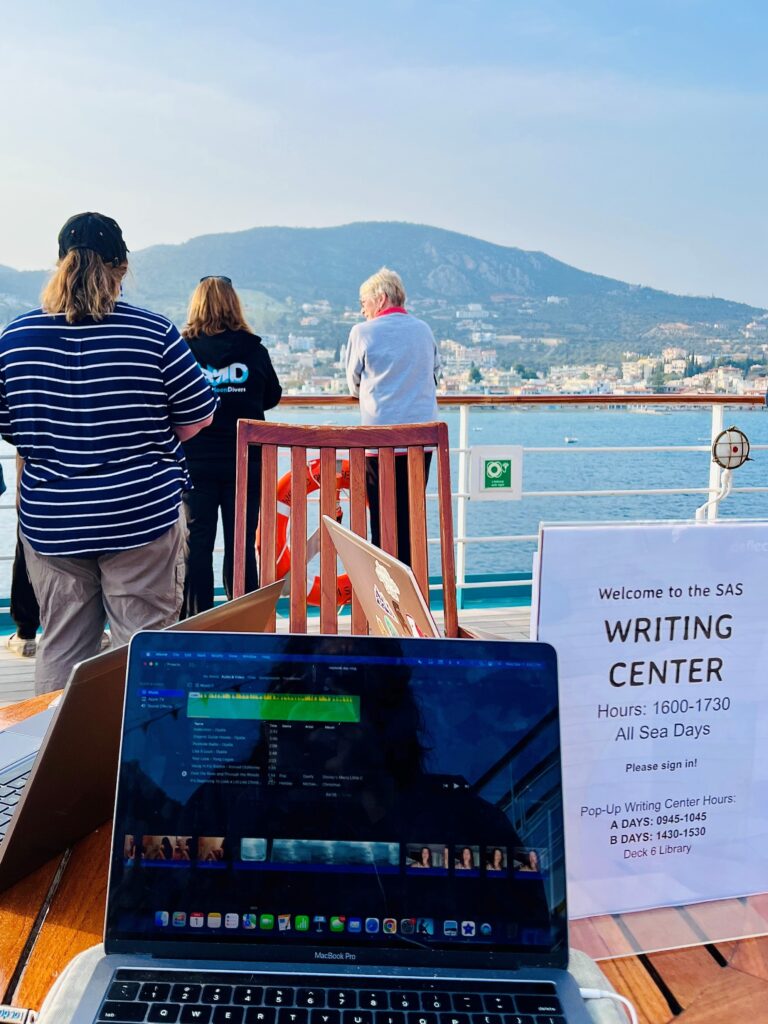
For many students, the writing center served as a primary resource for writing help since they could not easily look up rules and techniques online. On the other hand, we found many ways of being creative with the resources available to us. The internal ship “intranet” enabled (mostly) full access to Purdue’s OWL; this resource was extremely useful to students (and us) with its advice on numerous aspects of writing, including format and grammar examples that students could access after consultations. We also had a modest handbook of our own with frequently asked questions and access to some print resources in the ship library one deck below.
Consulting on a ship also presented some really unique opportunities. One day we moved the Writing Center to an outside table on Deck 7 while sailing through the Greek islands; we were surrounded by students coming to watch our Greek Captain navigate tiny and not-so-tiny islands. The views were breathtaking, and the energy was refreshing. Having our consultation table stationed outside during this special tour caught the eye of several students, and we ended up conducting a session about a short story for a contemporary fiction class with a backdrop of Karpathos, Naxos, and Ios islands in the South Aegean Sea.
Writing tips, RAs and Cookies: Ship Communication and Student Engagement
As we moved into our third month, we decided to host an “Ask a writing question/enjoy a cookie” event to support students’ end-of-semester writing work. Many students revealed their creativity in exchange for a treat with fun queries like “what is the antonym of onomatopoeia?” or “what is the meaning of writing?” Others posed questions about basic writing conventions, but even these would often lead to deeper discussions about the student’s assignments. These conversations helped us inform students of the resources available to them while creating a relaxed environment for them to anticipate and talk through their end-of-semester tasks. This epitomizes some the familiar and new communication tools we needed to create and employ during our time on board to promote writing center services with SAS students and faculty.
We crafted fliers and signage in public areas (where allowed; ship regulations were strict to protect the décor for summer use as a paid cruise ship); We wrote daily writing tips for publications in the daily ship-wide memo.
Writing Tip of the Day: “Use all ship resources—ask staculty to share expertise on topics, use free library resources, and save some time for in-port research.”
—Deans’ memo, 2023
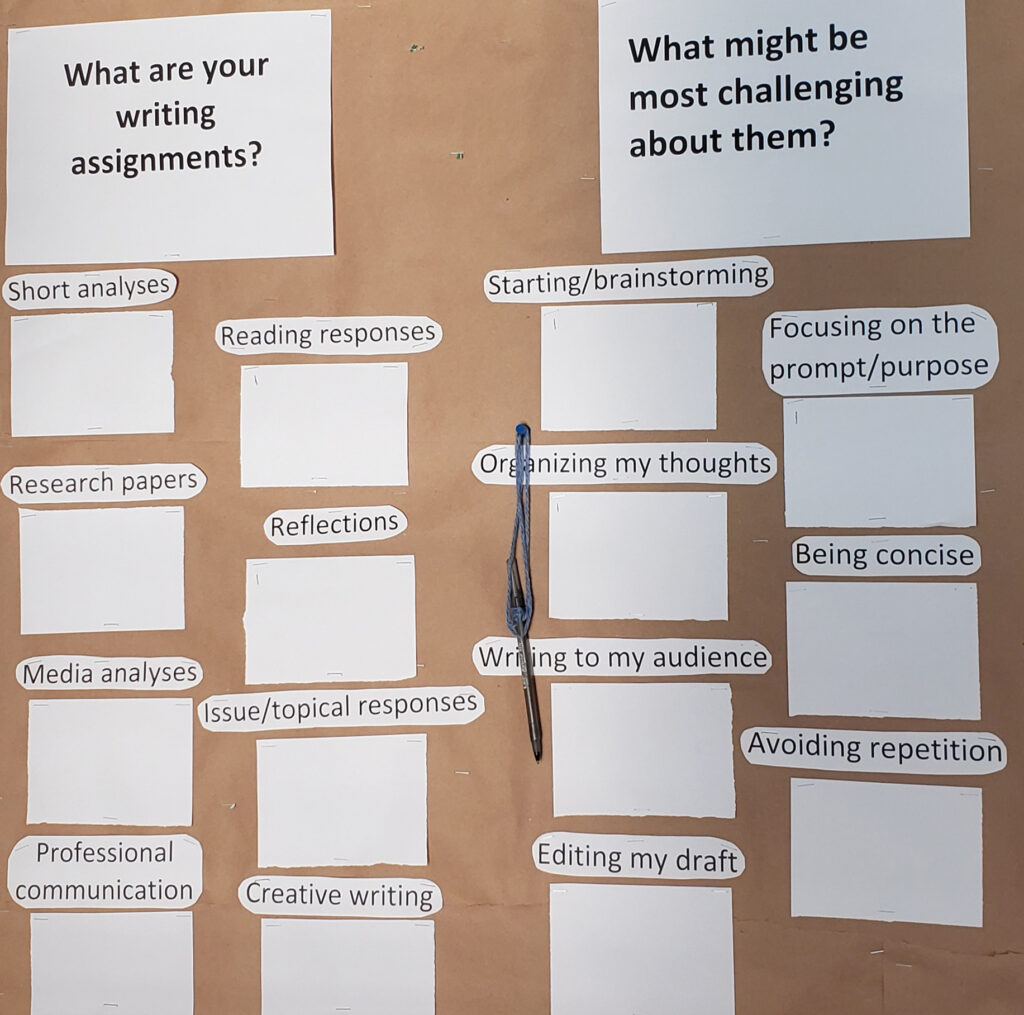
We also leaned into passive programming through regular and strategic use of a bulletin board outside the popular library lounge area, asking students to participate in a survey about their writing needs and perceptions of writing barriers. We used the data to create a rotation of tips and strategies for meeting their articulated challenges across the semester. Our closeknit community also enabled relationships with university staff who might be less accessible on traditional campuses. We were able to work directly with housing staff and leaders to promote writing center services through door signs and personal outreach.
Toward the end of the voyage, we extended this through an event for the ship kids. The kids brainstormed different words and phrases that came to mind when they thought of the ship, then filled out a page of one sentence reflections about the ship and what they imagine might happen on it. The last activity included bringing the kids out to certain decks, having them take notes about what they saw, felt, heard, tasted, and touched, and then they wrote descriptive poems we hung around the ship.
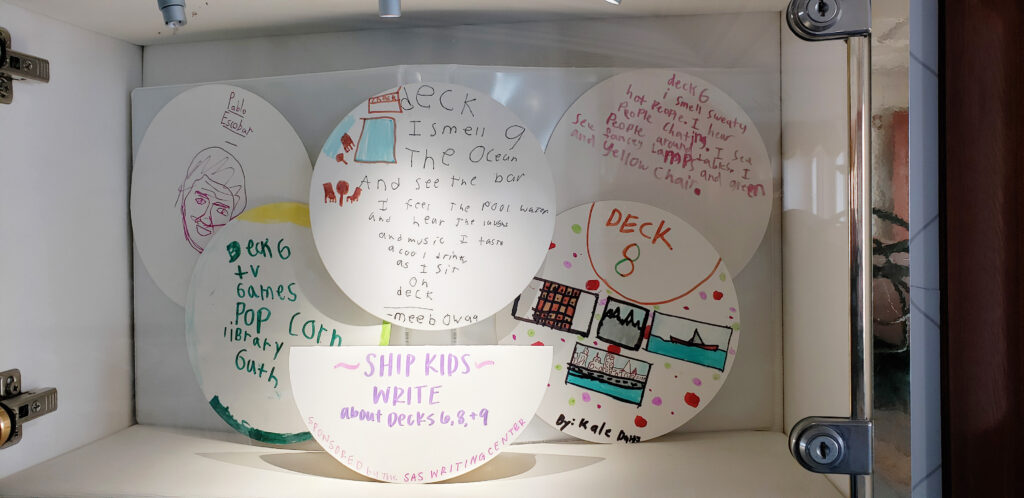
A Centered Writing Voyage
Directing and consulting with writers during the Semester at Sea voyage is a unique experience in the world of writing center theory, pedagogy, and practice; it has inspired and enabled creativity in the ways we use space and encourage writers to think about and draft writing. When queried about what they valued about writing (with their students in mind), staculty (staff + faculty) said “well-articulated claims with support from shared texts,” “authentic voice,” and “creative thinking.” Flexibility may be a concept we live by, but we also hold tight to the SAS notion that “the world is our campus.” We recommend partnering with programs like Semester at Sea or other study abroad experiences as a great way to promote and extend the work of writing centers.
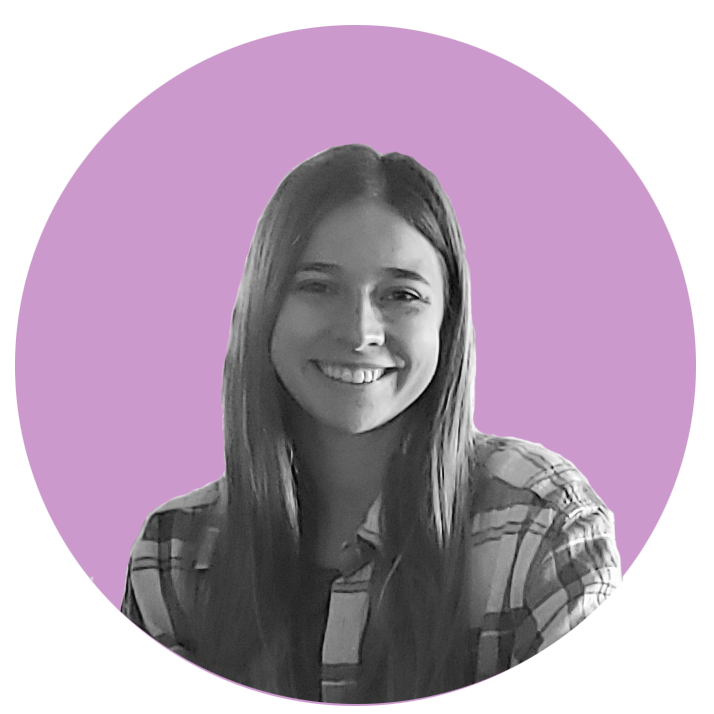
Marina De Greef currently studies English at the University of Tampa. While at school she works as a tutor in the Saunders Writing Center. She hopes to utilize her education to teach English as a second language. She served as a writing consultant during the Spring 2023 SAS voyage.
Tobi Jacobi is a writing and literacy professor in the English Department at Colorado State University where she currently serves as the director of the University Composition Program and runs community writing programs. She served as the SAS Writing Center director in Spring 2023.
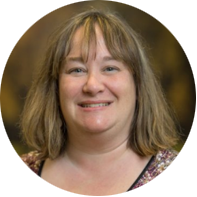
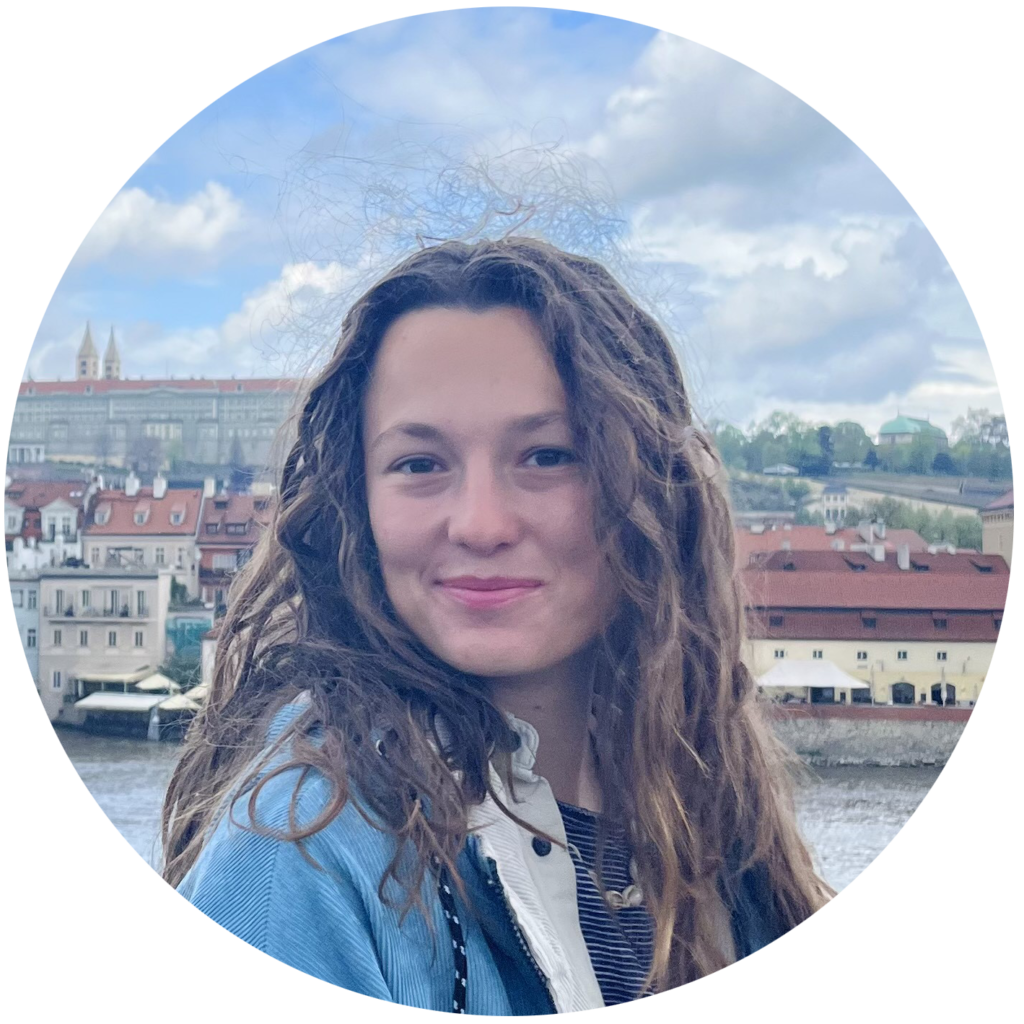
Sarah Neve graduated with a BA in Creative Writing and was Editor-in-Chief of the literary magazine at St. John’s University. She has participated in National Novel Writing Month for the past nine years in her pursuit to be a published novelist and poet. Publications include Calla Press, October Hill Magazine, Studio One, The Live Poets Society, and elsewhere. She also won the Center for Mission Essay Writing Contest and the 21st Century Emily Dickinson Award. She served as a writing consultant during the Spring 2023 SAS voyage.




